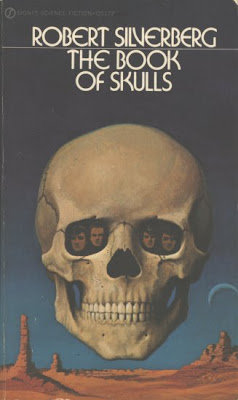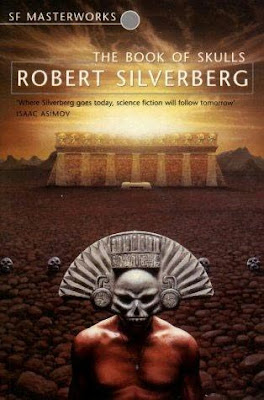They were good books, too. I might get around to writing up my thoughts about The Silent Land & Maigret Mystified at a later stage, but The Book of Skulls sort of screams out (soundlessly, in the desert sun) to be mulled over & written about & recommended to just about anyone. Well. Anyone over the age of sixteen who isn’t in the middle of a psychiatric crisis, & who isn’t a potential threat to themselves or others.

The Book of Skulls has more or less kicked this blog into life. This is ironic, given what it’s about.
I heard about this book through… I don’t know how I heard about this book. Online somewhere, I don’t know. The edition I tracked down is recent, a reprint through Gollancz’s “S F Masterworks” series. I don’t tend to read a lot of science fiction, & while this book was nominated for the Hugo, Nebula & Locus awards in 1972-1973 its genre status is open to interpretation. For me, this is clearly a metaphysical, existential type horror story. You’ll find others online arguing that it is sci fi in the true, pure sense – i.e. a fantastical/supernatural notion is being treated rationally within a credible real world setting. Does it matter? I don’t think these distinctions matter.
In the early 70s, four college room-mates are driving from New England to Arizona. The trip is happening in the present tense, & they’re taking turns narrating in stream of consciousness. Outside the car the Vietnam war is being fought, revolution & drug consciousness are sweeping through the campuses, sexual revolution is transforming America. Inside the car, there’s one thing on everyone’s mind, namely that Eli (the Jewish one) has found an old manuscript in the university library called the Book of Skulls, whose authors claim to hold the secret of immortality.
Maybe the document is genuine. Maybe the Keepers of the Skulls existed, or still exist – maybe Eli’s right & they have a monastery in the desert outside Phoenix. None of these kids are sure they believe it, in fact at least one definitely doesn’t believe. All the same, you have to take the chance.
According to the Book, the Keepers have conditions. Candidates must present themselves as a group of four (a Receptacle). One of the group must take their own life, & one other must be sacrificed by his friends, for the remainder of the Receptacle to attain immortality. So: one suicide + one murder = two live forever. That’s if the Book is for real.
That’s the pitch. (pause for effect) I know, right? Amazing. Everything I’ve just told you is conveyed in the first chapter, & the book takes off from there.

The covers of most editions of this book emphasise the desert setting, & maybe that’s another way of looking at this story – as a twisted sort of Western. Everything happens in sharp relief. The set-up is simple, there are a minimum number of characters, a mute sense of fate & confrontation looms overhead. The hidden passions, crimes, & inner deformities of its cast are dragged out into the open, life is weighed with death. Everything in the story happens for a reason. Or else everything that happens gradually gains significance, because at the heart of this situation there’s a terrible gravity.
Reading The Book of Skulls is a bit like watching a sports game. We meet the characters: some we like, others we don’t. To be honest, they’re each quite shitty in their own way. But they’re good characters & they're there to represent us, the readers. We watch them & bond with them, but we’ve been told what’s lurking up ahead for them, so… who’s it going to be? Who are you rooting for? That guy? You sure? OK well let’s see what happens…
By around 10 pages in I found that a weird, sick feeling was settling over me. The writing, the POV of the characters, is in no way melodramatic or ponderous – for the most part the tone is quite flippant, things play out naturally, it’s a smooth read – but all the same there’s an invisible thread stitched through it all, of anxiety, corruption… doom! I love this kind of thing. This book really got me thinking about mortality, morality, the boundaries of life. It’s a deceptively heavy (& increasingly uncomfortable) book.
There are a lot of ingredients going into this. Questions of faith, the relevance or defensibility of irrational thought in a rational, scientific world. Our need to try to extend life, the relevance or irrelevance of morality in pursuit of this goal. The inevitable traumas hidden inside us, the way these past moments create & define us. The philosophy which begins to emerge from all this, the philosophy of the Book of Skulls manuscript, is macabre (and cool): life can be attained by attuning oneself with death – the skull beneath the face, Death in Life, etc, a sort of morbid yoga. Past sins must be recalled, meditated on, confessed, but there is no call for penitence or forgiveness. The philosophy is cold, mechanical, amoral. This is not a situation where the good guy will necessarily come out on top. It’s a pragmatic & strangely credible process of self-transformation, & as readers we can only sit back & watch in horror (or fascination, or envy) as the change begins.
GOOD? Yes, definitely. It’s creepy, cool & intelligent. Unless you’re going through a depressive episode of something, you should read it.
FILE UNDER… Existential horror, western, dark side of the 60s revolution, morality play, New Age philosophy, yoga & self-improvement.
WOULD GO WELL WITH… Journal of the Dead, by Jason Kersten. Actually the film of JotD, “Gerry”, would have made a great double feature with the Book of Skulls film, had it ever been made. Turns out William Friedkin was going to make such a thing back in 2005/06, but it never happened. Shame.


There's one thing I forgot to mention when writing this up yesterday - the very creepy, very fucked up gender politics. I haven't read any other Silverberg, so I have no idea whether the book's/narrators' attitude to women (they are objects) is that of the author. I sort of assume not, or at least I hope not.
ReplyDeleteIt's bizarre, in any case. "Women = sex", & "sex = source of guilt & immature hangups, which must be regulated and mastered" seems to be a common trope of the mystical enlightment story. I guess sex is a nice & easy way to get deep inside a character's head?
I've gotten it out of the library and am going to make a start on it tonight.
ReplyDeleteHere's the thing, though: it's called "The Book of Skulls". How did you figure out that it was going to be a worthwhile read, rather than a fun pulpy novel? (You may have answered this in your review; I stopped reading the post once you'd explained what happened in the first chapter - that was enough to make me sign up.)
I have no idea! I can't for the life of me remember where I (quite recently) found out about this book. It could have been an Amazon recommendation or something?
ReplyDeleteAnd never fear - in fact I should have said so sooner, so I will do so now - I have taken a solemn oath to NEVER reveal plot points past, say, the 50 page mark.
Where it's necessary to get into story elements in order to discuss the theme of the book, I will talk about them in the most general possible terms.
SBQCYSIATTR is committed to being a spoiler-free (past the first 50 pages or so) site.
This won't apply to non-fiction books.
Yay, lovely to have you on the net again. While I am not currently in a depressive episode, and you have made this book sound very interesting, I suspect I will never read it. It's not that I'm against books that are fucked-up, but I'm certainly nervous of reading them. BTW Have you ever read _The Secret History_ by Donna Tartt? I'm not even quite sure why, but your description made me think of it. What's next in your reading? I've just read _Brave New World_ and I liked it better than I expected, though the end was a bit unsatisfactory.
ReplyDeleteHmm I'm trying to remember how Brave New World ends... I remember thinking that book was "pretty good".
ReplyDeleteI am very keen to read The Secret History - in fact you reminding me here may have just pushed me over the edge into seeking out a copy.
Next in my reading is a weird little word-play novel called Ella Minnow Pea - I was lent it from someone and really need to give it back.
But next to be written up (finished yesterday) is the Remains of the Day.
Finished Book of Skulls last night. It was good: I especially liked the way Silverberg refused to compromise on his premise. By about page 70 or so, I really settled into the book once I firmly believed that these 4 guys were going to find the secret to immortality out there in the desert.
ReplyDeleteThat didn't stop me pitying them because (from the subtext I was reading into the book), immortality was not going to be quite the lifestyle they imagined it to be.
I found myself admiring the way all the confessions were handled. Especially Timothy's confession to Oliver: there were two things about I thought notable
1.
Oliver's blase reaction to it (and how that was mirrored by Ned's blase reaction to finding out Oliver's secret)
2.
The way Timothy's confession changed my feelings about him made me far more satisfied with how the rest of the story played out.
Good recommendation, I say!
I'm glad you liked it Steve - & yeah, I totally agree about Oliver's reaction to Timothy (& Timothy's confession itself). It doesn't mark them, so much as it helps you understand that they've been like that all along. For me that was one of the major turning points... that and Eli's whole situation re: confessing to Ned.
ReplyDeleteI was really blown away by how everything had led up to the confessions, & how everything clicked into place immediately afterwards. I'd assumed that some sort of brutal "selection process" would need to take place, but the characters fell straight into their roles. It's a very well plotted book, eh?